On October 28, 2021, Mark Zuckerberg announced that Facebook was now Meta. The company will contribute to creating the metaverse, a virtual universe where we can “work, play, and coexist,” in approximately 10 years.
And the internet went wild.
As usual, some claimed the metaverse would be the bane of human existence. Others would welcome it with open arms.
We decided to delve into the subject and look beyond the trite “pros and cons” narrative.
So, we surveyed over 1,000 people about what “experiencing the metaverse” could really mean and how it may influence our identity, lifestyle, and finances.
We found the answers to the following questions:
- Is the metaverse a hope or doom for modern society?
- Would the metaverse change people’s identity and their sense of self?
- Can “censorship” and “the metaverse” even go together in one sentence?
- And many more
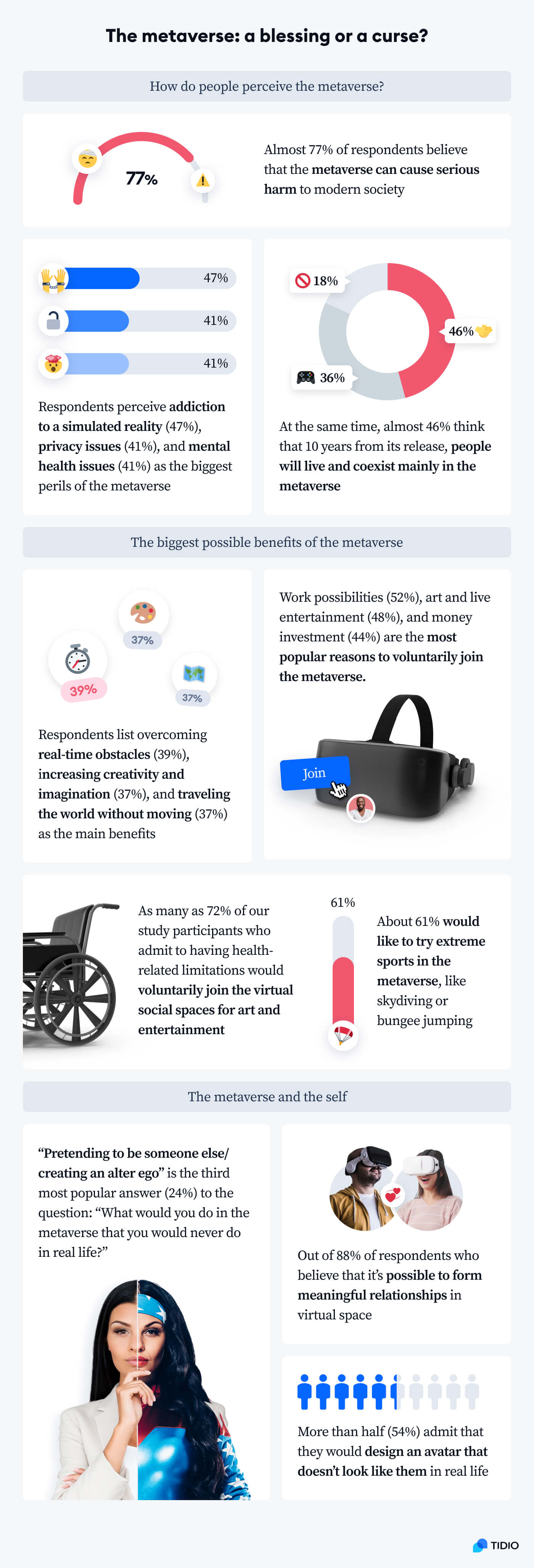
- Almost 77% of respondents believe that the metaverse can cause serious harm to modern society.
- Respondents perceive addiction to a simulated reality (47%), privacy issues (41%), and mental health issues (41%) as the biggest perils of the metaverse.
- At the same time, almost 46% think that 10 years from its release, people will live and coexist mainly in the metaverse.
- They list overcoming real-time obstacles (39%), increasing creativity and imagination (37%), and traveling the world without moving (37%) as the main benefits.
- Work possibilities (52%), art and live entertainment (48%), and money investment (44%) are the most popular reasons to voluntarily join the metaverse.
- As many as 72% of our study participants who admit to having health-related limitations would voluntarily join the virtual social spaces for art and entertainment. About 61% of them would like to try extreme sports in the metaverse, like skydiving or bungee jumping.
- “Pretending to be someone else/creating an alter ego” is the third most popular answer (24%) to the question: “What would you do in the metaverse that you would never do in real life?”
- Out of 88% of respondents who believe that it’s possible to form meaningful relationships in virtual space, more than half (54%) admit that they would design an avatar that doesn’t look like them in real life.
The metaverse statistics: major findings
Before we get into the stats, let’s answer the big questions.
What is the metaverse, and what can you do there?
The metaverse is a new version of the internet in the form of a 3-D virtual space. It can be accessed by people via VR headsets. When people enter the metaverse, they can interact with each other using avatars. It serves as a simulated, virtual ecosystem in which people can work, hang out or just enjoy many types of virtual entertainment. The concept ties augmented reality and virtual reality and takes it to the next level by creating a virtual world based on interoperability.
One of the interesting metaverse facts is that the global metaverse market size is estimated at over $38 billion in 2021.
And have you ever wondered what companies are involved in the metaverse?
Well—
Some of the biggest players in this virtual field include Meta, Microsoft, Minecraft, Roblox, The Sandbox, and Decentraland. These are just a few of the many companies developing and investing in metaverse platforms.
But it’s worth noting that the final product isn’t finished yet, so we can’t tell you how many people use the metaverse or even when exactly it will be released. It’s speculated though that we’ll be able to access the metaverse in 5 to 10 years.
Experiencing various digital worlds still sounds like something straight out of a science fiction novel. Just imagine buying virtual goods with digital assets, such as Ethereum or bitcoin. Also, think about the fact that metaverse users will be able to walk on virtual land and meet friends without ever leaving their houses. Crazy, right?
The authors of various posts and articles often mentioned “Ready Player One” movie, Neal Stephenson’s “Snow Crash” novel, and “Black Mirror” sci-fi TV series in one breath when discussing the subject of mixed reality and gamers living in the metaverse.
It’s also good to mention that the gaming industry is playing a big part in this development. Late 2010’s VR video games like Roblox made the concept more comprehensible. And when 12.3 million people attended Travis’ Scott virtual concert in Fortnite, it was clear that VR is not only here to stay, but it’s the future.
Facebook’s metaverse announcement just made it more official: the new, virtual reality is inevitable, although not all people seem to enjoy this thought.
As many as 77% of respondents believe that the metaverse can cause serious harm to modern society.
Even though big tech companies like Disney, Microsoft, Apple, and Google also announced that they work on developing the metaverse, it’s the Facebook rebranding into Meta that made the headlines and in many cases, caused outrage.
And there is a reason for that. Business Insider’s report found that Facebook is the least trusted social media platform regarding data privacy. This could explain the fact why our survey respondents are two times more concerned about the metaverse’s ownership of their private information (42% of answers) than unwanted exposure to explicit content (18% of answers) or an increase in cybercrime (26% of answers).
However, one of the key metaverse statistics that we found is that the biggest alleged dangers of the metaverse are connected to mental health and general well-being. Our respondents see the addiction to a simulated universe as a real threat (47%), along with mental health consequences such as depression and anxiety (41%), as well as increasing obesity (35%).
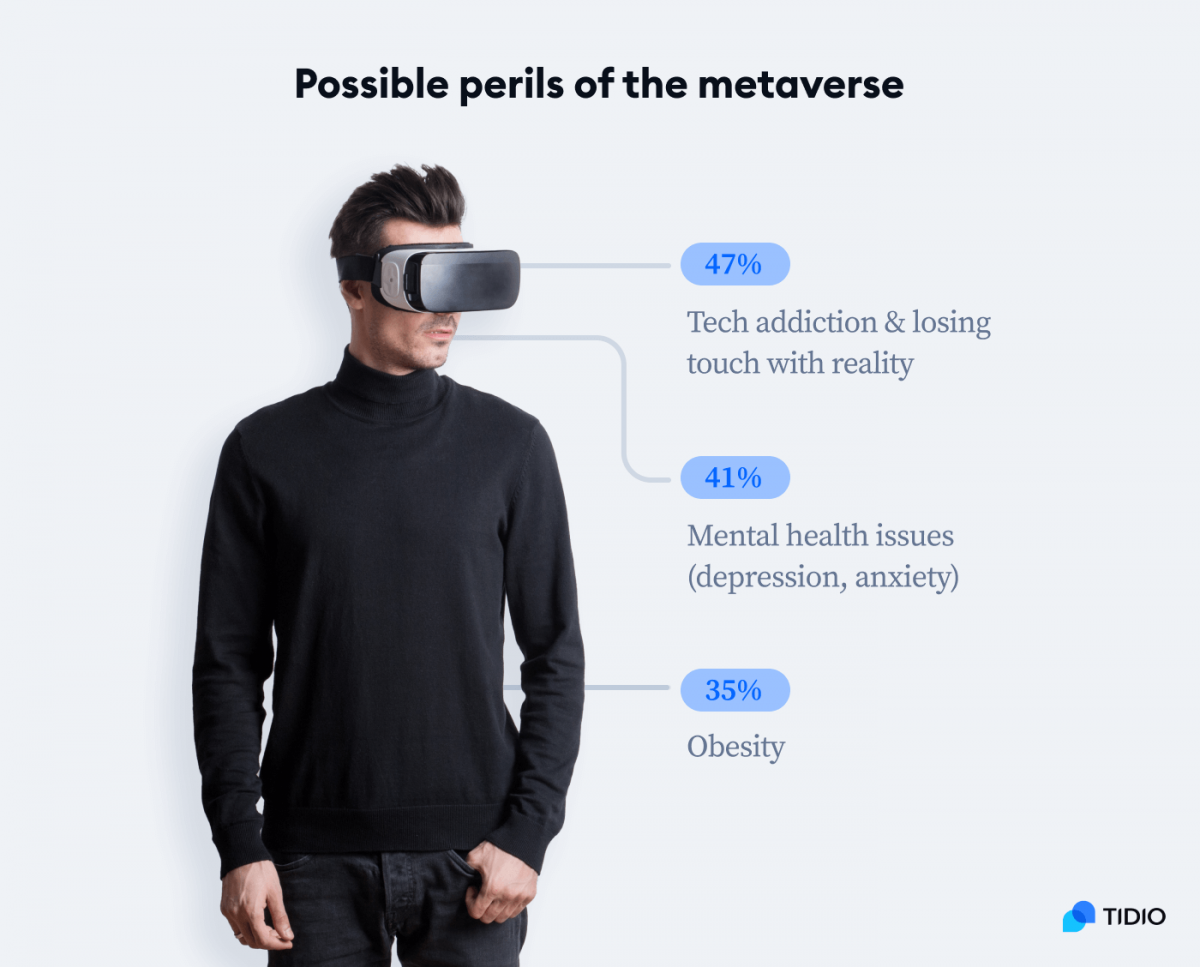
Some people who wanted to share specific answers said that the metaverse could cause “misinformation spread,” as well as create “information bubbles,” especially once it merges physical reality with augmented reality.
This seems to be confirmed by the experts on the subject, who warn us about information bubbles and “reality blocks” that can be created by augmented reality and the metaverse alike.
When you walk down a street in augmented reality, you will see a city filled with content that reinforces your personal views, deceiving you into believing that everyone thinks the way you do. When I walk down that same street, I could see vastly different content, promoting inverse views that make me believe opposite things about the very same citizens of the very same town.

But, from the positive side, let’s look more into the metaverse expectations and how metaverse will change the world in the future.
According to 46% of the survey respondents, in 10 years from the release of the metaverse, people will live and coexist mainly there.
Our metaverse statistics show that while 36% of respondents believe we will use metaverse for entertainment purposes only and 19% claim that it won’t be used on a daily basis—the majority of interviewed people say that humans will live in metaverse soon.
When asked about the main reasons internet users they would voluntarily join the metaverse, these were the top three answers: work possibilities (52%), art and live entertainment (48%), and money investment (NFTs and cryptocurrency trade) (44%).
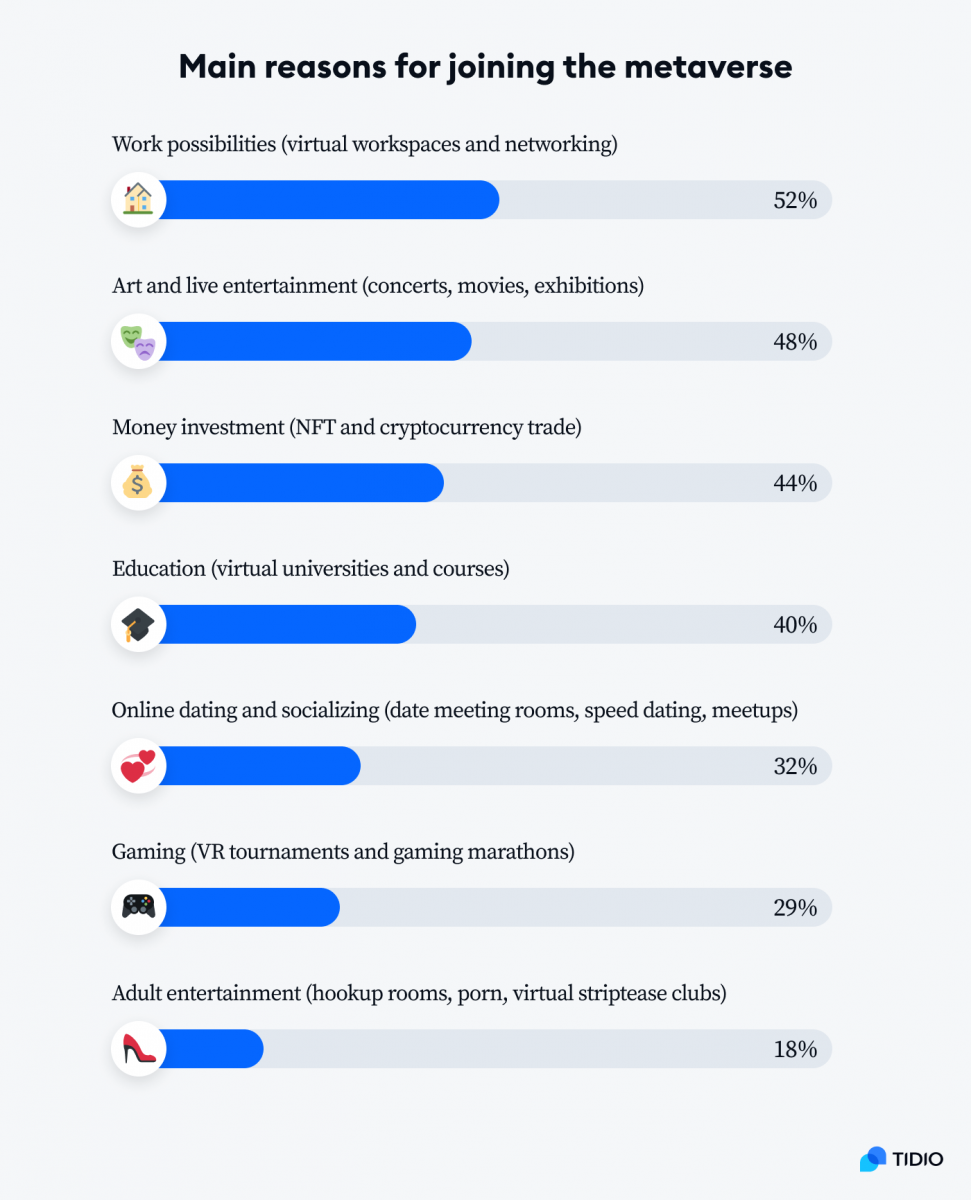
The choice is not surprising. After all, by creating an entirely new ecosystem, we create new possibilities. This means new job opportunities—the metaverse will need engineers, developers, VR and AR construction architects, and later on, who knows… maybe even metahuman doctors.
It also has the potential to become the center of the crypto trade, since cryptocurrencies like blockchain will probably be the main form of exchange in the metaverse. This raises questions about taxes on cryptocurrency in the metaverse, as governments are still grappling with how to regulate this new digital economy.
On top of that, the metaverse can unleash new forms of entertainment and truly revolutionize art, which Facebook itself stressed:
Most importantly, the metaverse will make all art, entertainment, or even travel available to everyone—even to the ones who couldn’t reach it before.
Our respondents agree—
Overcoming real-time obstacles (39%), increasing creativity and imagination (37%), and traveling the world without moving (37%) could be the biggest benefits of the metaverse.
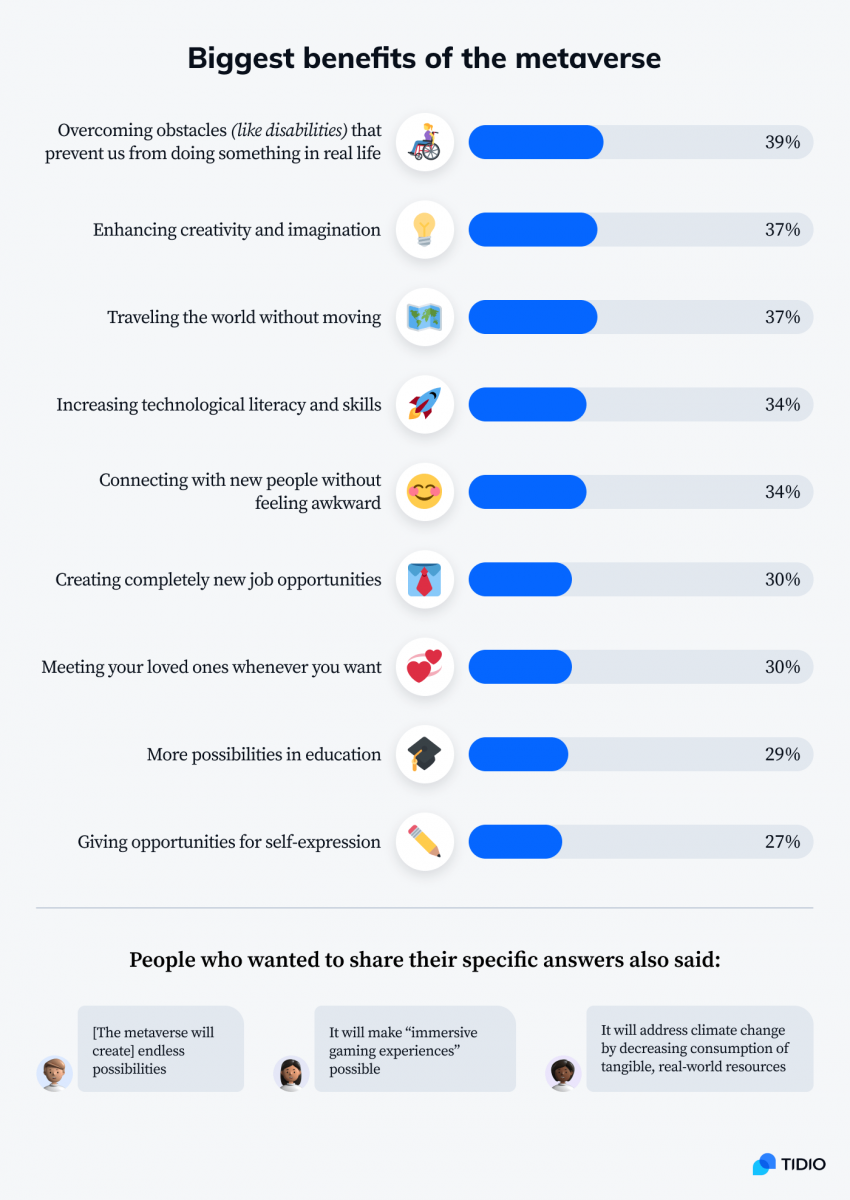
In fact, 72% of study participants whose health doesn’t allow them to do sports and enjoy the outdoors would voluntarily join the virtual social spaces primarily for the purposes of art and accessibility to entertainment. Furthermore, 61% of them would like to try extreme sports in the metaverse, like skydiving or bungee jumping.
But if all of this is possible… do we immerse in the “epic games” of the metaverse completely, and never come back? What happens to our identity then?
The metaverse and the self
A study about virtual self distinguished three levels of the self-presence framework in the digital world:
- Body self-presence level: happens and lasts only at the moment of using an avatar or an object that a person sees as the extension of self.
- Emotion-level self-presence: happens when a person is using any media that cause a strong emotional reaction. It can last for minutes or hours afterward.
- Identity-level self-presence: happens during virtual self customization and continuous usage. It reflects important aspects of personal identity, and it dissipates at a personality change rate—during weeks, months, or even years.
We can safely assume the metaverse will strongly affect all three levels of self, but the identity level most, due to its long-lasting dissipation rate. What’s more, the fluidity of experience that the metaverse will offer means we will be able to choose from numerous “possible selves” and experiment with our identities. Our respondents confirmed that claim.
About 54% of respondents admit that in the metaverse, they would design an avatar that doesn’t look like them in real life.
On top of that, our metaverse statistics found that “acting as someone else/creating an alter ego” is the third most popular answer (24%) to the question: what would you do in the metaverse, but never in real life?
When asked about their choice, respondents admit that they would want to experiment with their identity and experience being someone of different gender, race, or age in virtual reality (27%).
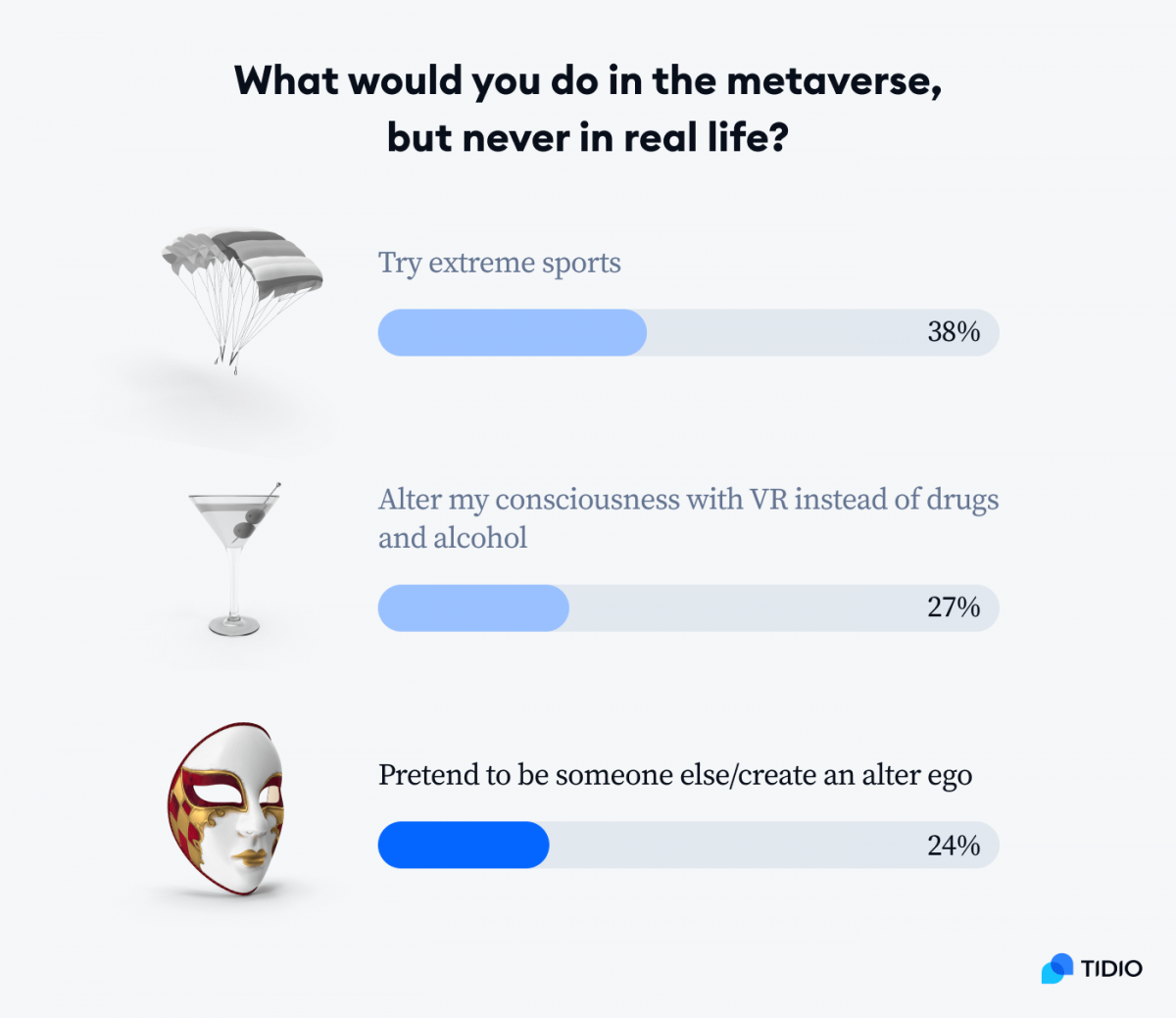
Almost 21% of respondents openly said that they would create an identity that will match how they feel on the inside. Some said that their choice to create an alter ego in the metaverse is simply motivated by more freedom (26%) and breaking the daily routine (12%).
These metaverse statistics may suggest that apart from exploration, people might want to create a different, “metaverse self” for the sake of escapism, be it from body dysmorphia, lack of self-acceptance, or simply boredom of everyday life.
On the other hand, some survey respondents were motivated by very human emotions. About 14% admitted that they would pretend to be someone else just to check if their spouse or partner cheats on them.
As many as 71% of men and 65% of women declare that they would engage in a virtual hook-up with a stranger they have met in the metaverse club.
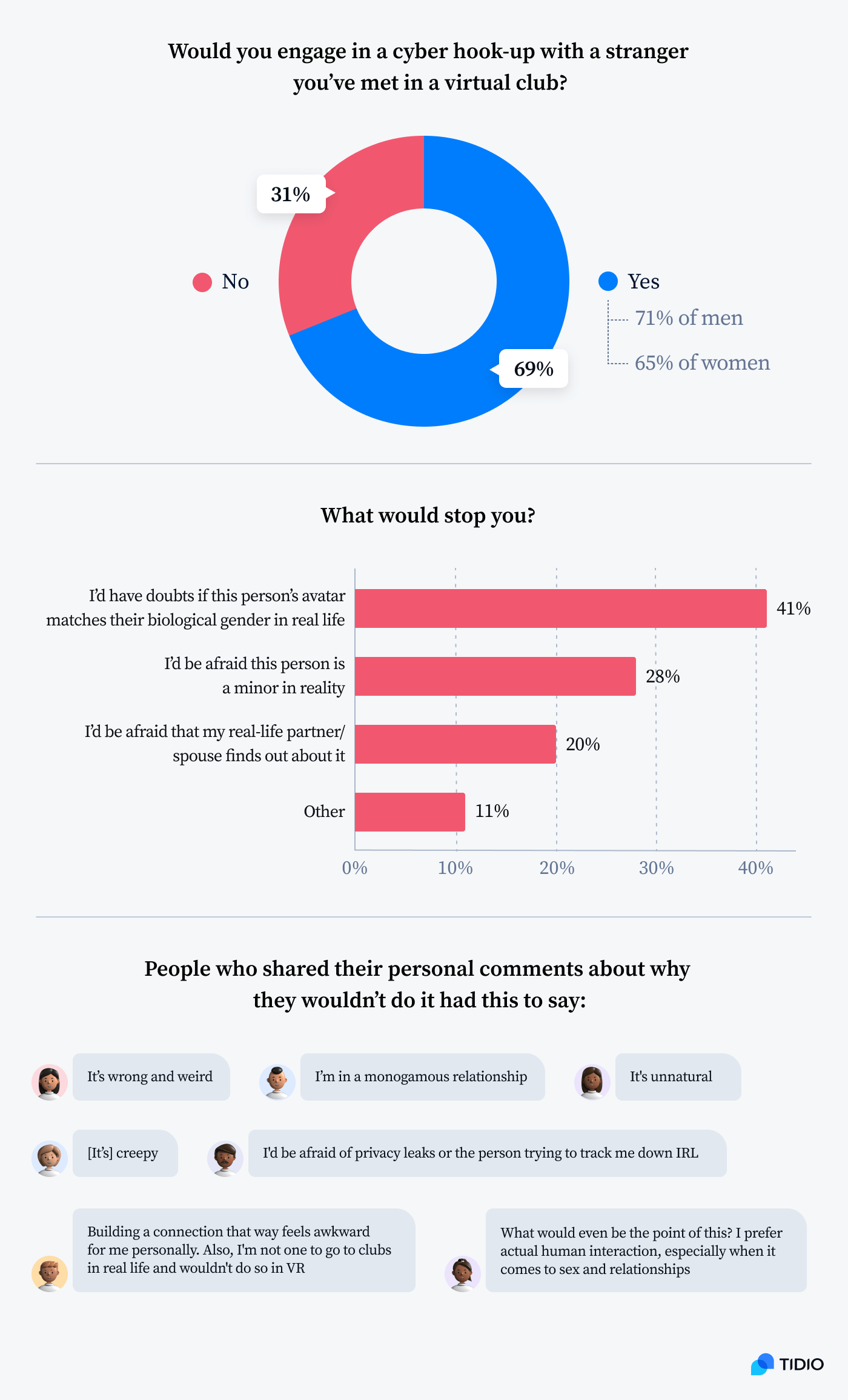
Almost every online game and social media platform is based on virtual human interaction, and it won’t be otherwise in the case of the metaverse. A whopping 90% of those who completed the survey believe that you can form meaningful relationships in the virtual space, and as it turns out, casual sexual interactions with strangers also count.
Think about it—the metaverse sex would allow people to connect intimately on an entirely different level than physical, even if it’s only physical in the metaverse reality. You could even date multiple people at once without consequences. On the flip side, it could become an escape from real-life relationships, and not in a positive way. And as we can all tell—emotions work across all platforms and realities.
As a matter of fact, 19% of those who wouldn’t engage in a virtual hook-up with a stranger, said that they would be afraid that their real-life partner or spouse would catch them cheating.
Others said that they would have concerns about the person’s biological gender in real life (41%) and legal age (28%). This might seem a bit paranoid at a first glance, but a recent study revealed that nearly one out of four women (23%) and one in three men (38%) confessed that they had perpetrated catfishing.
However, it turns out that male respondents are much more concerned about the person’s gender in real life (59%) compared to female respondents (25%). On the contrary, men wouldn’t resign from a virtual hookup easily because of their hypothetical metaverse lover’s legal age (22%) as opposed to women (42%).
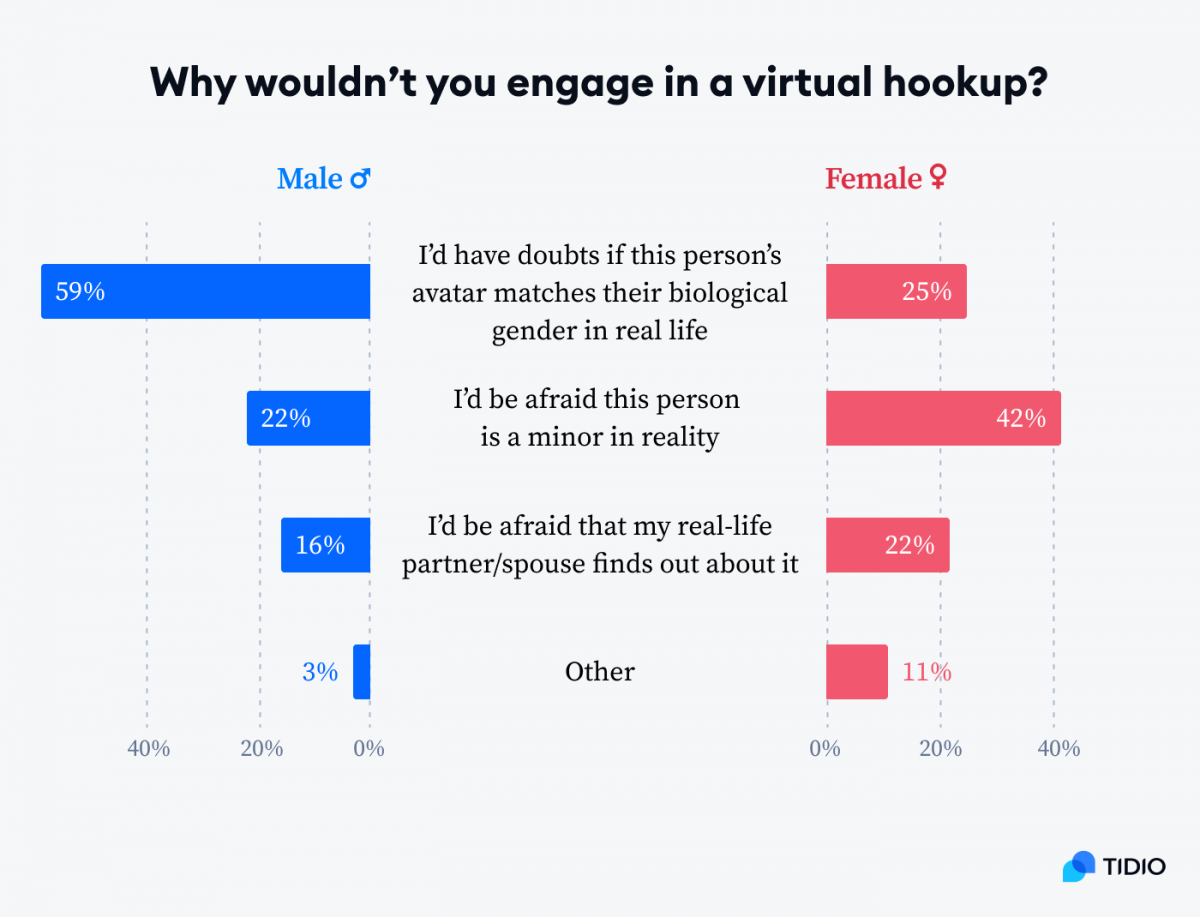
As many as 73% of respondents admit that they would play “Squid Game” or another “win or die” game in the metaverse.
Out of the minority, who stated that they wouldn’t play any type of “win the challenge or die” game (30%), respondents stated that it would be mentally disturbing for them (73%) or that they consider doing it unethical (23%), even if it takes place in the metaverse, not in the physical reality.
A high percentage of people who would engage in such activities is not a surprise. A lot of people enjoy watching thrillers and horrors, playing violent video games, and reading books about serial killers. According to Zimbardo, it’s completely normal.
He famously said:
Evil comes in many forms, with various disguises that are vital to understand before engaging that perennial adversary.

This means that our natural curiosity about “dark matters” can help us identify evil and prevent real-life danger.
What about getting the thrill of exploring something dangerous and dark, yet, not having to deal with the physical consequences of doing so? This might be one of the biggest appeals of the metaverse to a lot of people, which is confirmed by our research.
Some of our respondents claim they’d try big game hunting (22% of responses), playing adult games that engage in extreme violence and/or sex (20%), or attending virtual gladiators fights to death (19%).
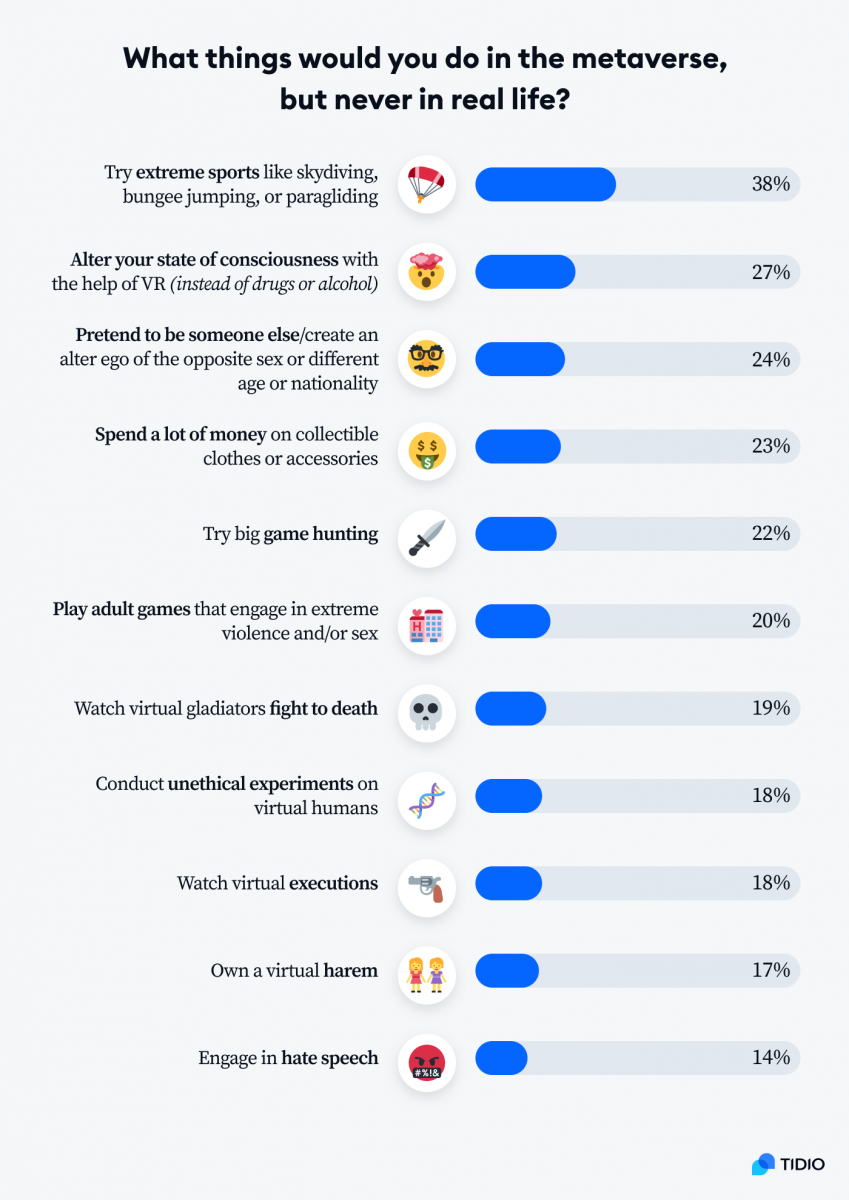
Can you blame them? Imagine this—you can hunt big game even if you’re an animal rights activist or engage in war battles as a pacifist.
What for? To find out what exactly you are fighting against.
If you know the enemy and know yourself, you need not fear the result of a hundred battles. If you know yourself but not the enemy, for every victory gained you will also suffer a defeat. If you know neither the enemy nor yourself, you will succumb in every battle.

However, when it comes to more ethical dilemmas and people posing a real-life danger, our respondents didn’t hesitate. Only 23% of people are “not sure” if registered criminals (like serial killers and sexual offenders) should live out their urges in the metaverse’s restricted spaces with the guidance of a therapist, for the sake of making society safer. As few as 17% of respondents think it’s a good idea, while over 59% of those who completed the survey said that it can backfire and actually make things worse.
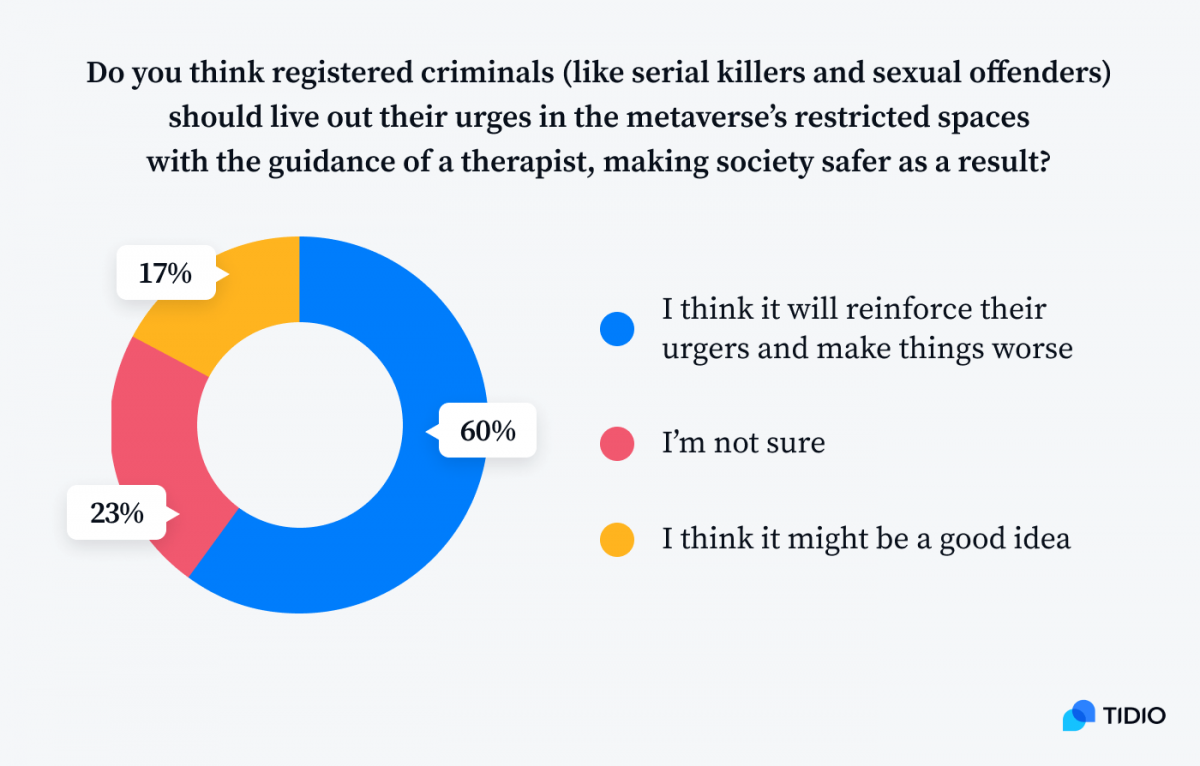
Asked about what they’d do in the metaverse, but not in real life, respondents put altering their state of consciousness with VR instead of drugs and alcohol (26% of answers) on the second place of the podium.
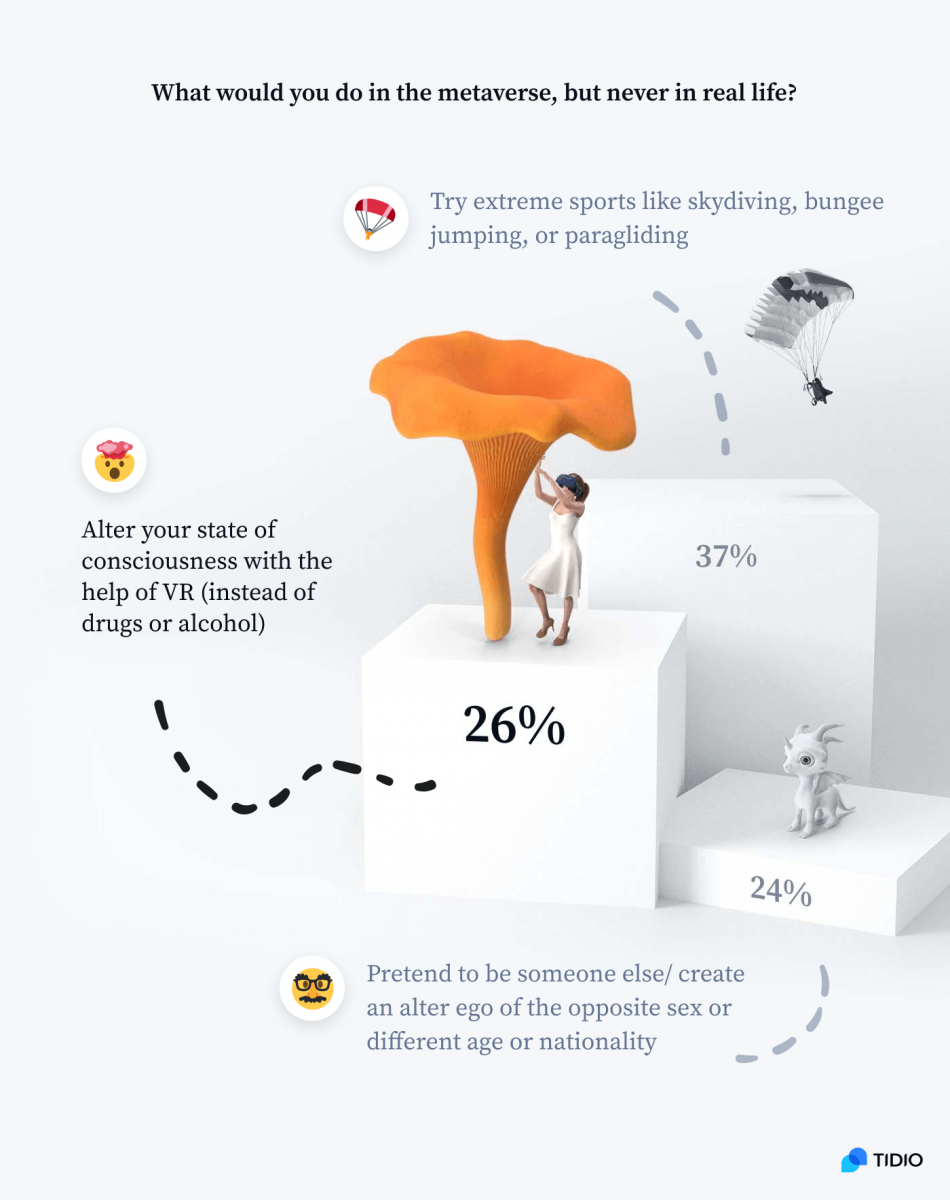
Trying extreme sports (37% of answers) was first, and creating an alter ego/pretending to be someone else (24% of answers) was the third most selected option, our metaverse statistics reveal. We already analyzed why getting the thrill out of (virtual) danger, or creating an alter ego can be exciting: but what about getting high in virtual reality?
The usage of LSD and mushrooms has been steadily increasing in the last few years. One study found that two-thirds of participants who were given psilocybin rated their session among the five most meaningful experiences of their entire lifetime.
And what is the signature feature of the metaverse? Scientifically speaking, “to immerse individuals into visual environments that transcend the limitations of their physical selves.” All of that without the possible side effects of taking mind-altering substances.
Our survey respondents seem to know this and are happy to try it out. After all, altering the state of consciousness in this way can definitely have a recreational purpose. But in the future… who knows? It may even have therapeutic implications.
Now—
How about censorship, drugs, alcohol, etc.? What will the metaverse look like for these aspects?
The censorship of the metaverse
Can “censorship” and “the metaverse” even go together in one sentence?
One of our respondents had this to say:
[If someone is suggesting] censorship of "hate speech" and "fake news" […] then they clearly don't even understand the point of the metaverse, crypto technology, or decentralization in general. It's gaining popularity because people are sick of the government and corporations […].
Our metaverse statistics show that the majority of respondents, however, didn’t share their point of view. According to other respondents, some contents should be fully censored with suicide (60%), animal abuse (57%), and hate speech and harassment (52%) getting the most votes.
And while research participants indicated that alcohol and drugs (53%), sexually explicit content (49%), and graphic violence (44%) should be restricted, some said that religious offenses (26%), and fake news (18%) should roam the metaverse freely.
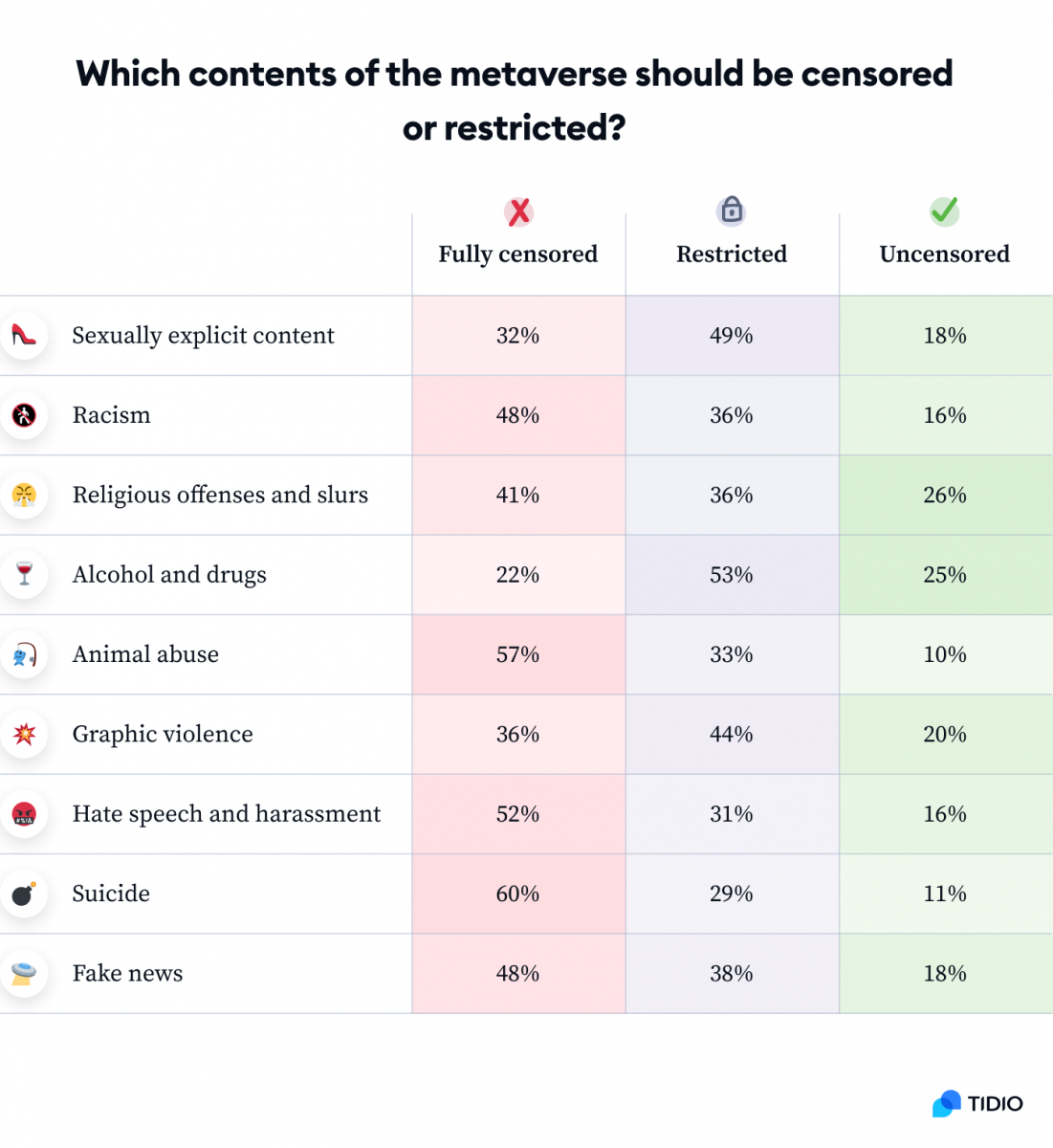
Okay, so the censorship of this technology is widely debatable by the people.
How about the hot topic of virtual currency, non-fungible tokens, and buying real estate in virtual environments? Let’s look at some facts about the metaverse connected to your finances online and in the physical world.
How the metaverse will influence the finances of an everyday person
Forbes reports that global spending on AR and VR headsets, software, and services, including purchases by consumers, increased by 50% and rose to $12 billion from 2019 to 2020.
According to our metaverse statistics, this upward trend is here to stay. While the average monthly in-app spend for gaming apps is $0.32, the metaverse has the chance to substantially increase it. Even though 23% of people declare they won’t spend money on clothes, skins, and accessories for their avatars, 33% declare that they would spend from $10 up to $50 per month for such goods.
About 22% would gladly spend up to $500 per month, and 2% of respondents wouldn’t mind spending more than $500 per month to customize their avatars. Spending a lot of money on collectible items in the metaverse is also the 4th (23%) on our list of answers to the question: “what would you do in the metaverse, but never in real life?”.
What about the gear?
It seems that if the metaverse becomes a primary source of entertainment, people won’t be satisfied with mediocre equipment.
Our metaverse stats show that about 39% of respondents would spend between $350 and $700 for a basic headset and controllers, which corresponds to the average costs of Oculus Quest and Rift. However, 11% of people wouldn’t mind spending $700-$1000 for an even more advanced headset. A small group of top VR users (3%) would even spend more than $1k to purchase their dream gear.
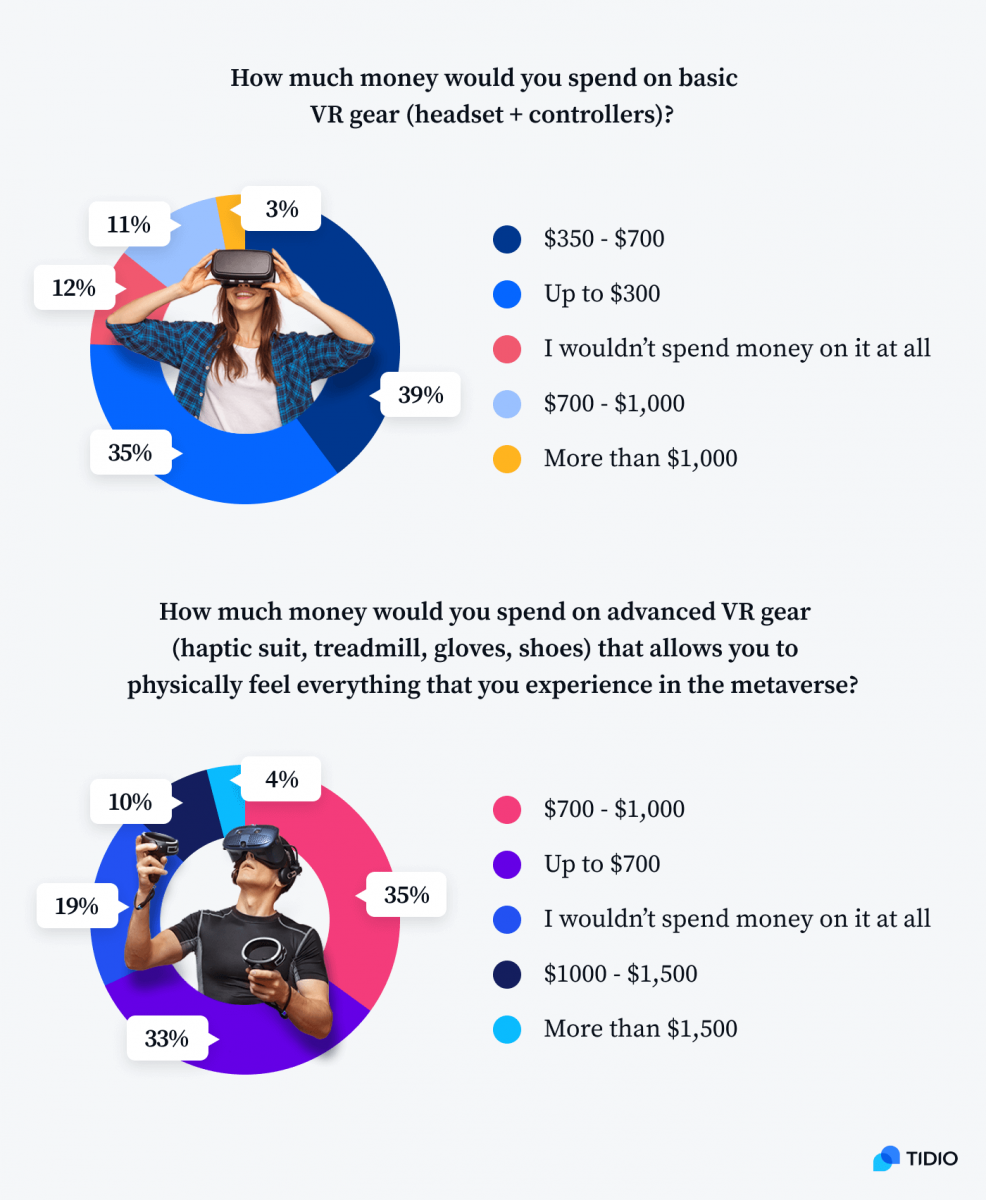
Speaking of top users, 35% of survey respondents would spend between $700 to $1000 on advanced VR gear such as gloves, a haptic suit, or a treadmill. Only 4% of respondents would splurge more than $1.5k on such goods.
One thing is certain: if our respondents have foreseen the future by saying that we will live primarily in the metaverse 20 years from now, we will be spending a significant amount of money to enjoy it.
The metaverse: conclusions
Metaverse, web 3.0, reality labs, and so on are all booming subjects. But they’re also relatively new concepts.
Therefore, it’s doubtful that any recent study can answer whether the metaverse will do more good or bad for an average person or for modern society as a whole. Currently, a lot of people are on the fence about the concept itself, even openly admitting that it can be dangerous, but seeing it as a part of our future reality at the same time.
Some things are certain: it can be a remarkable invention offering endless possibilities, but if used improperly, it can threaten our reality.
We just need to remember that what will happen once it becomes part and parcel of our everyday lives, depends on us, too.
Sources:
- Self-Presence, Explicated: Body, Emotion, and Identity Extension Into the Virtual Self
- Psychedelics and Virtual Reality: Parallels and Applications
- Why We’re Obsessed With Understanding Evil
- Americans Increase LSD Use—and a Bleak Outlook for the World May Be to Blame
- Adult Attachment and Online Dating Deception: A Theory Modernized
- Metaverse: Augmented Reality Inventor Warns It Could Be Far Worse Than Social Media
- Mark in the Metaverse: Facebook’s CEO on Why the Social Network Is Becoming ‘a Metaverse Company’
- The Amazing Things You’ll Do in the ‘Metaverse’ and What It Will Take To Get There
- Mark Zuckerberg’s Metaverse Could Fracture the World as We Know It
- What Will the World Look Like When You Can Be Whoever You Want in the Metaverse?
- More Than 12 Million People Attended Travis Scott’s Fortnite Concert
- Facebook Ranks Last in Digital Trust Among Consumers
- New Jobs in the Metaverse
- Global App Spending Habits
- Augmented and Virtual Reality After COVID-19
- Sun Tzu on the Art of War
- Metaverse market cap
- Companies involved in the development of Metaverse
Methodology:
For this study about the metaverse and how it can affect our everyday lives, we collected answers from 1050 respondents. We used Amazon’s Mechanical Turk and Reddit.
Respondents were 58% males, 42% females, and less than 1% identifying as non-binary. They had to answer 24 questions—the majority of which were yes/no and multiple-choice questions. The survey had an attention check question.
Fair Use Statement:
Has our research helped you learn more about the metaverse? Feel free to share statistics from this study. Just remember to mention the source and include a link to this page. Thank you.

